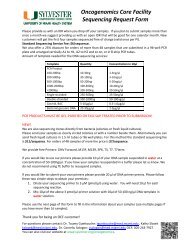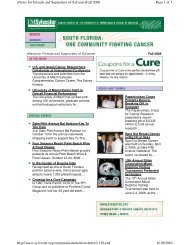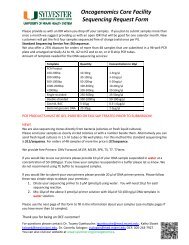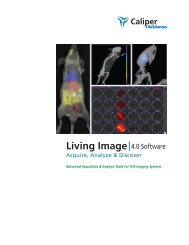SCIENTIFIC REPORT 2004 - Sylvester Comprehensive Cancer Center
SCIENTIFIC REPORT 2004 - Sylvester Comprehensive Cancer Center
SCIENTIFIC REPORT 2004 - Sylvester Comprehensive Cancer Center
You also want an ePaper? Increase the reach of your titles
YUMPU automatically turns print PDFs into web optimized ePapers that Google loves.
T U M O R C E L L B I O L O G Y P R O G R A M<br />
HIGHLIGHTS/DISCOVERIES<br />
• Observed the attachment of centrosomes to IF.<br />
Although the implications of the mechanism of<br />
detachment during mitosis are still to be assessed,<br />
this may be relevant for cancer therapy.<br />
OLUWATOYIN SHONUKAN, M.D.<br />
Assistant Professor of Medicine<br />
DESCRIPTION OF RESEARCH<br />
Malignant melanoma arises from the melanocytes,<br />
cells that originate in the neural<br />
crest. Normal melanocyte development in the<br />
neural crest and subsequent migration of the<br />
melanocyte precursors into the skin require<br />
trophic signals from the neurotrophin family<br />
of growth factors. With terminal differentiation,<br />
melanocytes lose expression of neurotrophin<br />
receptors. Following transformation, however,<br />
melanoma cells aberrantly express the receptors<br />
for the neurotrophins, with more advanced stages<br />
of the disease being more likely to express the<br />
neurotrophin receptors than the earlier stages.<br />
Dr. Shonukan’s research discovered that the<br />
melanoma cells also express several members of<br />
the neurotrophin growth factor family, thus<br />
suggesting that the neurotrophin/neurotrophin<br />
receptor system may be involved in the mediation<br />
of melanoma progression. The focus of her<br />
laboratory’s research is to understand the role<br />
of the neurotrophins and their receptors in the<br />
mediation of tumor progression in malignant<br />
melanoma.<br />
SELECTED PUBLICATIONS<br />
2003<br />
Shonukan, O, Bagayogo, I, McCrea, P, Chao, M,<br />
and Hempstead, B. Neurotrophin-induced melanoma<br />
cell migration is mediated through the actin-bundling<br />
protein fascin. Oncogene<br />
22:3616-23, 2003.<br />
HIGHLIGHTS/DISCOVERIES<br />
• Nerve growth factor (NGF), the prototypic<br />
member of this family of growth factors, mediates<br />
the invasiveness of melanoma cells in vitro<br />
by inducing the coupling of the intracellular<br />
domain of the p75 neurotrophin receptor with<br />
the actin cytoskeleton.<br />
• Neurotrophin-induced melanoma invasiveness<br />
is mediated by signals generated through PI-3<br />
kinase.<br />
• NGF induces the disruption of cadherin-mediated<br />
cell-cell adhesion, thereby permitting melanoma<br />
cells to dissociate from the keratinocytes<br />
in the epidermis and invade the dermis, from<br />
whence they metastasize to distant sites. Dr.<br />
Shonukan’s ongoing research efforts include<br />
identifying the components of this pathway in<br />
order to identify therapeutic targets.<br />
RAKESH SINGAL, M.D.<br />
Associate Professor of Medicine<br />
DESCRIPTION OF RESEARCH<br />
Dr. Singal’s research focuses on the mechanisms<br />
that inactivate certain tumor-suppressor<br />
genes in prostate cancer. A common mode of<br />
such inactivation involves a modification (methylation)<br />
in DNA. By understanding how genes are<br />
silenced, treatments can be developed to activate<br />
them and thereby prevent the development and/<br />
or progression of prostate cancer. Researchers in<br />
Dr. Singal’s laboratory also are studying methylation<br />
of selected genes as a diagnostic and prognostic<br />
marker in prostate cancer.<br />
The present screening techniques for prostate<br />
cancer are very inefficient, and two out of three<br />
patients undergo prostate biopsy unnecessarily<br />
to detect cancer. <strong>Cancer</strong> patients often have a<br />
small amount of DNA circulating in their serum,<br />
thought to be released from the cancer cells. Dr.<br />
Singal’s laboratory has shown that certain methylated<br />
genes are present at a substantially higher<br />
percentage in prostate cancer tissue but not in<br />
benign prostatic conditions. Researchers are<br />
UM/<strong>Sylvester</strong> <strong>Comprehensive</strong> <strong>Cancer</strong> <strong>Center</strong> Scientific Report <strong>2004</strong> 93
















